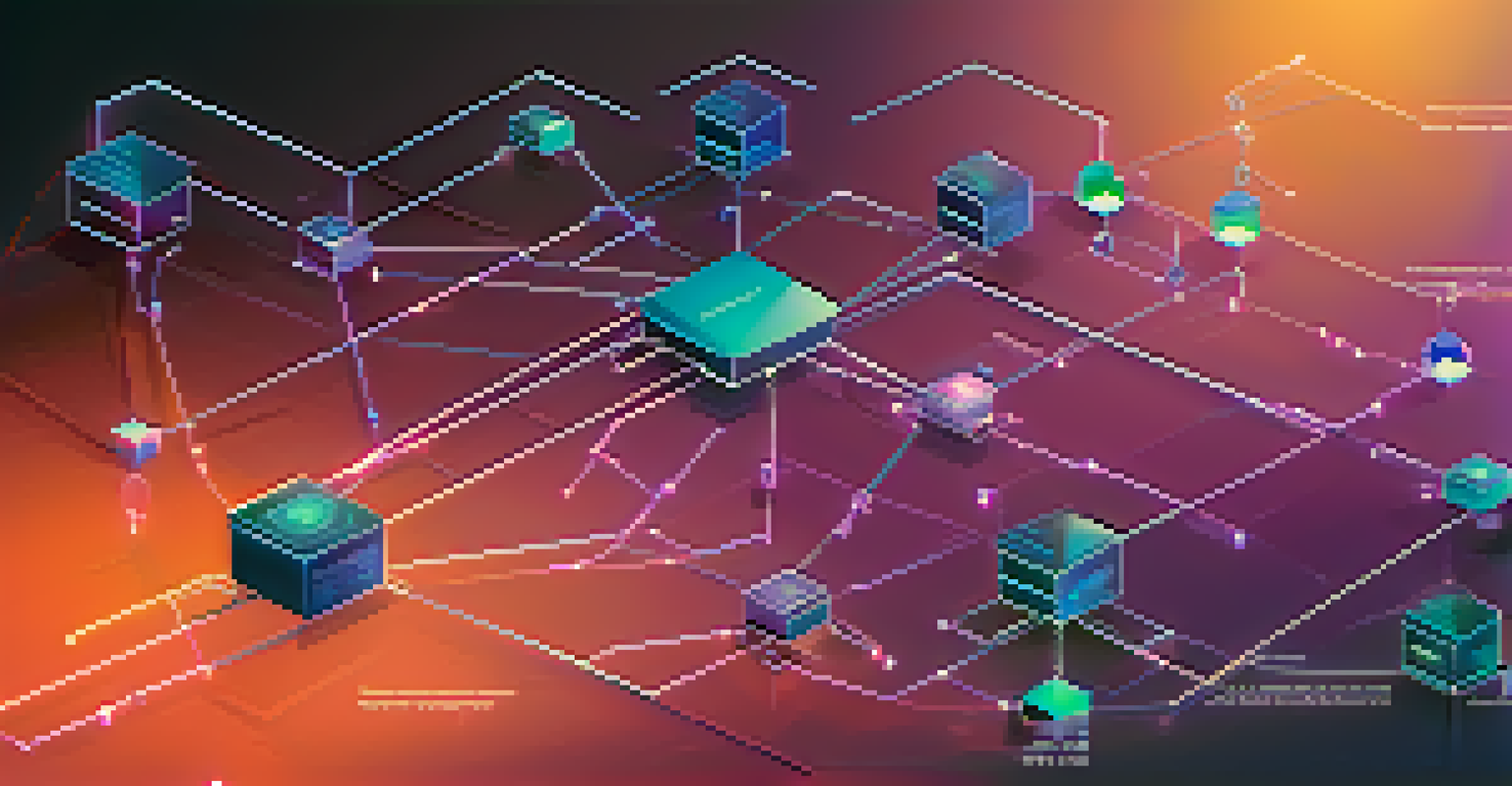The Role of Smart Contracts in NFT Regulation Compliance

What Are Smart Contracts and NFTs?
Smart contracts are self-executing contracts with the terms directly written into code. They operate on blockchain technology, which ensures transparency and security. NFTs, or non-fungible tokens, are unique digital assets that represent ownership of a specific item, such as art or collectibles, on the blockchain.
Smart contracts are not just a theoretical concept; they are actively shaping the future of NFT regulation.
The combination of smart contracts and NFTs enables automated transactions, removing the need for intermediaries. This synergy not only enhances efficiency but also minimizes the risk of fraud. Understanding their roles is crucial in the context of regulatory compliance.
As the NFT market continues to grow, the demand for clear regulations becomes ever more pressing. Smart contracts can help ensure that these regulations are adhered to by automating compliance checks, making them integral to the evolving landscape.
The Importance of Regulation in the NFT Market
Regulation in the NFT market is essential to protect consumers and foster trust. With the rapid rise of digital assets, there have been numerous cases of fraud, copyright issues, and market manipulation. Effective regulation can help mitigate these risks and promote a safer environment for buyers and sellers alike.

Moreover, clear guidelines can encourage mainstream adoption of NFTs. When potential buyers feel secure in their transactions, they are more likely to engage in the market. Thus, regulation is not just about control; it's about creating opportunities for growth.
Smart Contracts Automate Compliance
Smart contracts are programmed to enforce rules automatically, ensuring adherence to regulations and minimizing disputes.
Smart contracts can assist in this regulatory framework by embedding compliance mechanisms directly into the transaction process. This ensures that all parties adhere to established guidelines, thereby promoting a healthier NFT ecosystem.
How Smart Contracts Ensure Compliance
Smart contracts can be programmed to enforce specific rules and regulations automatically. For instance, they can verify whether a seller has the right to sell an NFT, ensuring that copyright laws are respected. This automatic verification minimizes the potential for disputes, creating a smoother transaction process.
The future of NFTs and their regulation hinges on how effectively smart contracts can be utilized.
Additionally, smart contracts can incorporate features that track the provenance of an NFT. This means that buyers can easily verify the ownership history, which is crucial for authenticity. Knowing the background of an NFT can significantly influence a buyer's decision.
By embedding these compliance checks directly into the contract, the process becomes seamless. This not only enhances trust among users but also reduces the burden on regulatory bodies to monitor every transaction manually.
Challenges in Implementing Smart Contracts for Compliance
Despite their potential, implementing smart contracts for regulatory compliance isn't without challenges. One major hurdle is the lack of standardized regulations across different jurisdictions. As laws vary from one region to another, creating universally compliant smart contracts becomes complicated.
Moreover, the technology itself can be daunting for some users. Many individuals still lack a solid understanding of blockchain and smart contracts, which can lead to hesitance in adopting these solutions. Educational efforts are crucial to bridge this knowledge gap and encourage wider usage.
Regulation Fosters NFT Market Trust
Effective regulation is crucial for building consumer trust in the NFT market, encouraging mainstream adoption and safer transactions.
Lastly, there's the issue of security. While blockchain is generally secure, vulnerabilities can exist within smart contracts themselves. Ensuring that these contracts are thoroughly audited and tested is vital to prevent exploitation and ensure compliance.
Real-World Examples of Smart Contract Compliance
Several platforms are already utilizing smart contracts to ensure compliance in the NFT space. For example, some marketplaces require that NFTs be minted with a smart contract that includes compliance features, such as royalty payments to original creators. This helps enforce copyright laws and encourages fair compensation.
Another notable example is the use of smart contracts in auctions. By automating the bidding process and ensuring compliance with auction rules, platforms can create a fairer environment for all participants. This transparency builds trust and encourages more users to engage in NFT transactions.
These real-world applications show that smart contracts are not just theoretical concepts; they are actively shaping the future of NFT regulation. As more platforms adopt these practices, we can expect to see a more structured and compliant NFT market.
The Future of Smart Contracts in NFT Regulation
Looking ahead, the role of smart contracts in NFT regulation is likely to expand. As regulatory frameworks become more established, smart contracts will need to evolve to accommodate these changes. Continuous development will ensure they remain relevant and effective in enforcing compliance.
Furthermore, advancements in technology may lead to more sophisticated smart contracts that can adapt to varying regulations in real-time. This flexibility could allow for smoother cross-border transactions, making the NFT market even more accessible.
Challenges in Smart Contract Adoption
Implementing smart contracts faces hurdles such as varying regulations, technological complexity, and security concerns.
Ultimately, the future of NFTs and their regulation hinges on how effectively smart contracts can be utilized. By embracing these technologies, we can build a more secure and compliant digital asset ecosystem.
Conclusion: Embracing Smart Contracts for a Safer NFT Space
In conclusion, smart contracts play a pivotal role in ensuring compliance within the NFT market. Their ability to automate and enforce regulations can significantly enhance trust and security for users. As the landscape evolves, the integration of these technologies will be essential for fostering a healthy ecosystem.
While challenges remain, the potential benefits of smart contracts are too significant to overlook. By addressing the hurdles and promoting education around these tools, we can pave the way for a more compliant and thriving NFT market.

As we move forward, it’s crucial for stakeholders, including creators, buyers, and regulators, to collaborate. Together, they can harness the power of smart contracts to create a safer, more transparent, and compliant NFT environment.